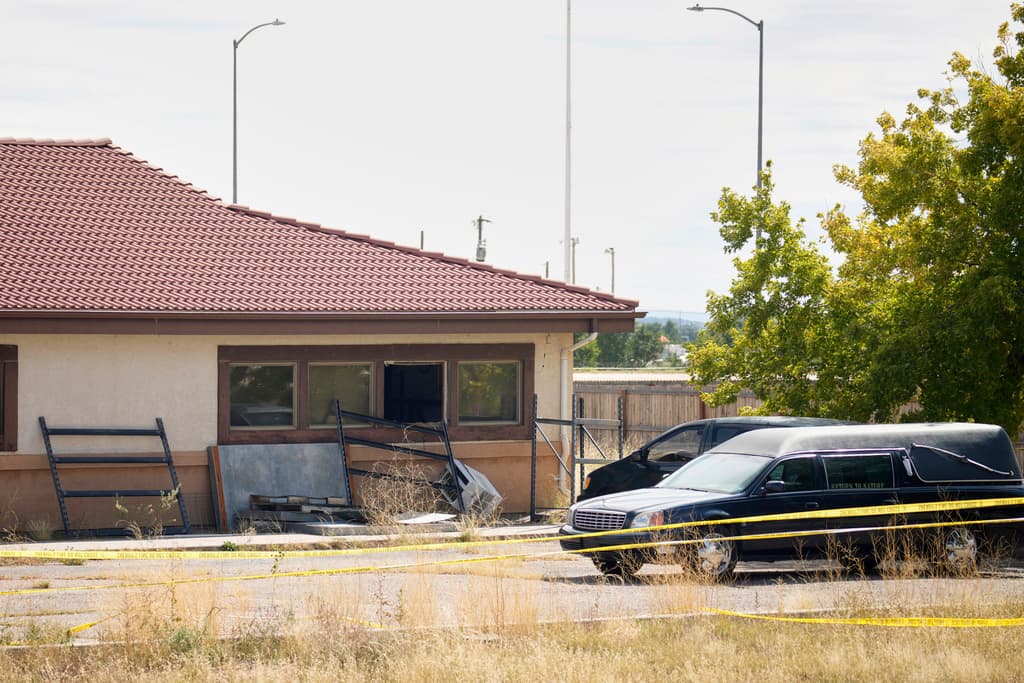
A Colorado judge on Friday rejected a plea agreement for a funeral home owner who acknowledged abusing 191 corpses, many of which languished in a room-temperature building for years as the owner and his wife maintained a lavish lifestyle.
The rare decision to reject the agreement came after families of the dead who were given fake ashes asked for a more severe punishment for Jon Hallford, who owned and operated Return to Nature Funeral Home in Colorado Springs with his wife, Carie.
The plea agreement called for a 20-year prison sentence that would run concurrently with his 20-year federal sentence, meaning he could have been freed many years earlier than if the sentences ran consecutively.
Colorado has struggled to effectively oversee funeral homes and, for many years, had some of the weakest regulations in the nation. It’s had a slew of abuse cases, including an estimated 20 decomposing corpses discovered this week at a funeral home in Pueblo.
Numerous family members had pressed Judge Eric Bentley to reject the agreement with Hallford. Among them was Crystina Page, whose son’s remains rotted away for years. She said the plea agreement would have essentially erased the crimes committed against her son and the other 190 people whose bodies have been identified.
Jon Hallford is already bound for prison after pleading guilty to federal fraud charges. The rejection of the plea deal effectively resets the separate state criminal case. Hallford can now withdraw his guilty plea, sending the case to trial.
Defense attorney says trial would not provide families with answers
Bentley said he had never before rejected a plea agreement in his nine years on the bench and called it an “extreme action by the court.” He said he was swayed after listening to the family members' testimony.
“I heard an overwhelming perception that the justice that had been worked out between the attorneys was justice that did not accurately reflect the truth of the victims' experiences,” Bentley said.
The prosecutor, Rachael Powell, had argued that a 20-year sentence was appropriate since abuse of a corpse is the least serious type of felony under the law, with a possible sentence ranging from probation to a maximum of up to 18 months in prison.
Defense attorney Adam Steigerwald said a trial would not deliver what family members wanted: answers.
“There’s nothing about this case or the allegations that are not widely known because of the intensive media presence and interest in this case,” he said. “The answers the people are looking for, sadly, are not satisfactory, and they largely don't exist.”
Carie Hallford is accused of the same crimes as her husband and also pleaded guilty. Her sentencing on the corpse abuse charges has not been scheduled.
The couple was accused of letting 189 bodies decay. In two other instances, the wrong bodies were buried. Four remains were yet to be identified, the district attorney's office said this week.
The Hallfords got a license for their funeral home in 2017, and authorities said the bodies started piling up by 2019. Many languished for years in states of decay, some decomposed beyond recognition, some unclothed or on the floor in inches of fluid from the bodies.
The Hallfords bought luxury items after defrauding the government
As the gruesome count grew, Jon and Carie Hallford were also defrauding the federal government out of nearly $900,000 in pandemic relief aid.
With the money from families and the federal government, the Hallfords bought ritzy items from stores like Tiffany & Co., a GMC Yukon and Infiniti worth $120,000 combined, laser body sculpting and $31,000 in cryptocurrency.
In 2023, a putrid smell poured from the building and the police turned up. Investigators swarmed the building, donning hazmat suits and painstakingly extracting the bodies. Hallford and his wife were arrested in Oklahoma, where Jon Hallford had family, more than a month later.
Families learned that their cathartic moments of grief — spreading a mother's ashes in Hawaii or cradling a son's urn in a rocking chair — were tainted by a deception. It was as if those signposts of the grieving process had been torn away, unraveling months and years of working through their loved ones' deaths.
Some had nightmares of what their relatives' decayed bodies must have looked like. Others were anguished by the fear their family members' souls were trapped, unable to go free.
Brown reported from Billings, Montana.
- Family sues Southern Colorado funeral home where 189 decaying bodies were found over alleged fake ashes
- Customers believe Penrose funeral home gave them fake ashes, fabricated cremation records
- Colorado funeral home owners accused of abandoning nearly 200 bodies spent cremation money on vehicles, dinner








